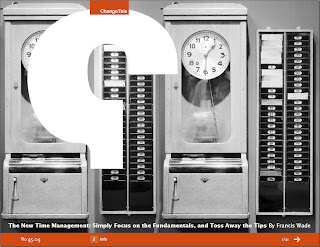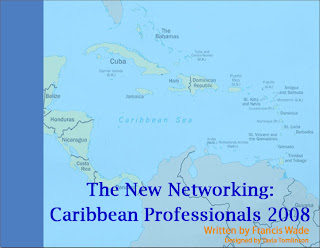 Yesterday, I figuratively nailed my own version of Luther’s Theses to the ChangeThis.com website.
Yesterday, I figuratively nailed my own version of Luther’s Theses to the ChangeThis.com website.
I can’t claim that it had the same historical significance as other more famous printed texts, but it did feel good.
My ChangeThis.com manifesto was published yesterday, calling for a new approach to time management thinking.
In the 21 page PDF document, entitled “The New Time Management: Simply Focus on the Fundamentals, and Toss Away the Tips”, I make the point that working professionals the world over have destroyed their productivity and peace of mind by buying gadgets, and buying-into too many tips from other people.
Instead, they should be focused on perfecting their time management skills by focusing on the fundamentals of time time management. The manifesto focuses on the first 7 fundamentals (the essentials) without getting into the 4 advanced fundamentals.
Here is the info for retrieving it:
ChangeThis Newsletter No. 45
* * * *
* * * *
45.04
The New Time Management: Simply Focus on the Fundamentals, and Toss Away the Tips
by Francis Wade
“As working professionals across the world, we all want the same things when it comes to time management. We want to feel a certain peace of mind that comes from knowing that our affairs are in order and that we’ve not forgotten something that might jump up later to give us a nasty surprise.”
http://changethis.com/45.04.NewTime
http://changethis.com/pdf/45.04.NewTime.pdf
…………….
WANT TO WRITE YOUR OWN?
We’re here to spread great ideas. Got one?
http://www.changethis.com/submit
…………….
THE MOST TALKED ABOUT MANIFESTOS
See the sorted list right here:
http://changethis.com/archives?by=email_count
…………….
WANT IT IN RSS?
Use our feed:
http://feeds.feedburner.com/ChangethisNewsletter
…………….
Please don’t be afraid.
Forward this to your friends.
ChangeThis is a vehicle, not a publisher.
We’re here to spread great ideas.
If you have any, let us know.
http://www.changethis.com/submit
If you didn’t subscribe to this,
a thousand times forgive us. Follow
the links below to unsubscribe.
 For those who might be interested, I will be releasing a multimedia e-book that I have been writing for some time in June. It’s called “The New Networking: Caribbean Professionals 2008.”
For those who might be interested, I will be releasing a multimedia e-book that I have been writing for some time in June. It’s called “The New Networking: Caribbean Professionals 2008.”

